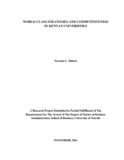| dc.description.abstract | This study sought to establish world class strategies and competitiveness at Kenyan universities. The specific objectives were to explore the core competencies, determine competitive priorities and find out the operational strategies at the Kenyan universities. It was guided by theories on RBV approach and Trade-offs in operational competitiveness. To achieve the main objective, a research was carried out using descriptive study design to sample two public and two private universities in Kenya. The tool for data collection was a structured questionnaire whose validity and reliability was tested using face validity as well pilot testing using data from two sample universities. The study found that various Kenyan universities were having different core competencies but mainly ‘pooled knowledge’ for public universities and ‘technical capabilities’ for private universities. For competitive priorities, public universities applied cost while private universities had flexibility of programs as key to their competitiveness respectively. Operational strategies used at public universities focused on exhibitions and fund raising while private universities concentrated on usability and ease of online functionability to increase their numbers. It was also found that Kenyan universities have got very few or low shared technologies as well as innovations implying that they operate mostly as single independent units in research and innovations. Regression analysis indicated that the highest beta coefficient was 3.126 for competitive priorities while the lowest beta coefficient was 1.273. Even though the regression intercept of 1.6 was a high figure, it could not be of any use since it was meaningless since no university existed without a form of strategy in place and hence it only acted as an anchor to the regression model. From the findings, it was recommended that Kenyan universities should take measures that enhance their global competitiveness. Similarly, universities should intensify their search for strong partners and linkages with giant technological firms in order to enhance their research/innovation mission accomplishments. Finally, it was recommended that clear and open communication from university leaders was key to achieving operational strategies that would improve their global competitiveness. Since the highest beta coefficient was produced by the competitive priorities, it would be advisable for Kenyan universities to pursue that strategy for achieving world class competitiveness. | en_US |



